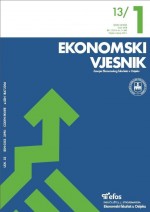Model e-marketinga humanitarnih organizacija u Republici Hrvatskoj
E-marketing of Humanitarian Organizations in the Republic of Croatia
Author(s): Stojanka DukićSubject(s): National Economy, Business Economy / Management, ICT Information and Communications Technologies
Published by: Sveučilište Josipa Jurja Strossmayera u Osijeku, Ekonomski fakultet u Osijeku
Keywords: e-marketing; humanitarian organizations; information and communications technologies; structural model of e-marketing of humanitarian organizations; e-marketing techniques of humanitarian organization
Summary/Abstract: The early 21st century marked the start of a new era in which information and communications technologies have played a key role. Owing to these technologies, a large part of the physical processes has moved into a virtual environment. As a result, there is a noticeable trend of ever-increasing volume of business activity carried out in the virtual environment – electronic business (e-business). In much the same way, business operations have transformed from a physical into a virtual form, so has the marketing assumed a new form called e-marketing. E-marketing is basically global; it operates 365 days a year/24 hours a day, and, in principle,uses a free resource provided by the global information infrastructure, i.e., the Internet. Businesses today have no choice but to use e-marketing. The same applies to non-profit sector to which humanitarian organizations belong. There are a large number of humanitarian organizations in the Republic of Croatia. However, these organizations are often run by people with no knowledge of marketing or management. It is therefore not surprising that as a result the production concept has been applied instead of the marketing concept. As the business environment changes, those who fail to adapt are bound for failure. This research was conducted to find an optimal model for application of e-marketing in humanitarian organizations working in the Republic of Croatia. In view of the rapid development of information and communications technologies, the model defined in this research will be viable for the next five to eight years.
- Issue Year: 26/2013
- Issue No: 1
- Page Range: 199-213
- Page Count: 9
- Language: Croatian

